News
Mariela Castro: Father is ‘supportive’ of pro-LGBT efforts
Cuban president’s daughter’s to lead IDAHOT marches


Mariela Castro, daughter of Cuban President Raúl Castro and niece of former Cuban President Fidel Castro, takes part in a march to commemorate the International Day Against Homophobia and Transphobia in Havana on May 14, 2016. (Washington Blade photo by Michael K. Lavers)
“He understands,” Mariela Castro told Hatzel Vela, a Havana-based reporter for the South Florida television station WPLG. “He is supportive.”
Mariela Castro, who is director of Cuba’s National Center for Sexual Education that is known by the Spanish acronym CENESEX, spoke with Vela last week at her organization’s headquarters in Havana’s Vedado neighborhood. WPLG broadcast the interview on Monday night.
Same-sex marriage in Cuba will take ‘long time’
Mariela Castro became CENESEX’s director in 2007 after her mother, Vilma Espín, who was the president of the Cuban Federation of Women, passed away.
Transgender people have been able to obtain free sex-reassignment surgery under Cuba’s national health care system since 2008, although independent LGBT activists with whom the Washington Blade has spoken maintain only a few dozen people have been able to undergo the procedure. Mariela Castro, who is a member of the Cuban National Assembly, in 2013 voted against a proposal that banned discrimination in the workplace based on sexual orientation because it did not include gender identity.
CENESEX since 2007 has commemorated the International Day Against Homophobia and Transphobia — which is May 17 — in Havana and in other cities around the country. Mariela Castro spoke with WPLG less than a week before she is scheduled to speak at a press conference in the Cuban capital that will mark the beginning of this year’s series of events.
Mariela Castro told Vela she remembers the stares and “disapproval from people” that she saw in 2007 when she and a group of trans people walked around Havana to mark the International Day Against Homophobia and Transphobia.
“I was scared,” she said.
Then-President Fidel Castro, who is Mariela Castro’s uncle, in the years after the 1959 Cuban revolution that brought him to power sent more than 25,000 gay men and others deemed unfit for military service to Military Units to Aid Production, which were labor camps known by the Spanish acronym UMAP. The Cuban government forcibly quarantined people with HIV/AIDS in state-run sanitaria until 1993.
Cuba repealed its sodomy law in 1979. Fidel Castro in 2010 apologized for the work camps during an interview with a Mexican newspaper.
Mariela Castro, who publicly supports marriage rights for same-sex couples, told reporters in March there is a “legislative package” that would extend rights to LGBT Cubans.
She said earlier that month during an appearance at a film festival in the Mexican city of Guadalajara the country does not “like to copy anyone” as she discussed why Cuba has yet to extend marriage rights to same-sex couples. Mariela Castro during the WPLG interview dismissed criticism from independent activists who say she has not done enough to publicly advocate for the issue.
“It is something that takes a long time,” she told Vela.
Critics of Cuba’s human rights record should ‘inform themselves’
CENESEX’s International Day Against Homophobia and Transphobia events will take place less than six months after Fidel Castro’s death. They will also occur against the backdrop of continued criticism over Cuba’s human rights record.
Independent LGBT activists with whom the Blade regularly speaks maintain authorities harass and detain them because they publicly criticize Mariela Castro and her father’s government. Plainclothes officers and security officials on Monday detained a protester with an American flag as he briefly disrupted a May Day celebration in Havana’s Revolution Square.
The U.S. and Cuban in 2004 began the process of normalizing diplomatic relations.
“I want to respond politely,” Mariela Castro told Vela in response to his question about those who question her efforts to spearhead LGBT issues against the backdrop of Cuba’s human rights record. “They should inform themselves.”
“Get rid of your hate, prejudices and stereotypes,” she added, speaking directly to Cuban exiles in Miami who remain opposed to her father’s government and the normalization of relations between the U.S. and the Communist island.
Los Angeles County
New on the LA County Channel
You can watch on Channel 92 or 94 on most cable systems, or anytime here. Catch up on LA County Close-Up here

New on the County Channel

L.A. County is investing millions of dollars in American Rescue Plan funds for paid early education apprenticeships. The Early Care and Education Assistant Teacher Apprenticeship Program aims to bolster the education career pipeline and bring relief to those hoping to avoid financial debt.
You can watch more stories like this on Channel 92 or 94 on most cable systems, or anytime here. Catch up on LA County Close-Up here.
In Case You Missed It
April is “Sexual Assault Awareness Month”

This April marks the 23rd observance of Sexual Assault Awareness Month. Sexual Assault Awareness Month is a chance for each of us to think about the role we can play in preventing sexual abuse, assault, and harassment.
Violence is preventable. Stopping sexual abuse, assault, and harassment before they happen requires us to work together to support healthy, safe, and respectful behaviors and environments. To build truly connected communities, we must start with community accessible services and support and expand the network of service providers. When it comes to sexual violence, everyone has a role to play to help build a community that is safer, inclusive, and equitable. Below are some resources and ways for you to get involved:
- Raise Awareness: The National Sexual Violence Resource Center
- Participate in Denim Day | April 24, 2024: 5 Ways to Participate in Denim Day and Denim Day Rally & Press Conference
- Learn More: Office of Family Violence Prevention and Services and The Rape, Abuse, and Incest Network (24/7 Confidential Support Hotline)
If you or someone you know has been sexually assaulted, call the National Sexual Assault Hotline: 1-800-656-4673.
Learn more at lacounty.gov/sexual-assault-awareness-month/.
At Your Service
Commercial Acquisition Fund Program

The Los Angeles County Department of Economic Opportunity recently launched the Commercial Acquisition Fund to provide grants to qualifying nonprofit organizations to support the acquisition of vacant or abandoned land and buildings in designated communities that were most negatively impacted by the COVID-19 pandemic.
The Commercial Acquisition Fundis funded by the County, with $10 million in American Rescue Plan Act funds and will be awarded as recoverable grants, ranging from $500,000 to $2,000,000. Acquisitions and funding must occur before December 1, 2024.
To learn more, apply, or sign-up to attend a community webinar, visit lacaf.info.
Out and About
April 21 – April 27th is “National Crime Victims’ Rights Week”

Join District Attorney George Gascón, the LA District Attorney’s Bureau of Victim Services and the LA District Attorney Crime Victims Advisory Board for this special National Crime Victims’ Rights Week panel discussion: “Pathways to Healing: Supporting LA’s Crime Survivors.”
This hybrid event will be on Thursday, April 25 at 6 PM, with doors opening at 5:30 PM. Click here to register to attend.
Photo Finish

Celebrate the 4th year of SOAR at the South Coast Botanic Garden when butterflies return May 1!
Click here to access more photos of LA County in action.
West Hollywood
City of West Hollywood is hosting a Public Safety Open House
The open house is an opportunity to engage as a community to prioritize safety and well-being along with WeHo Public Safety partners

By Paulo Murillo | The City of West Hollywood is partnering with the West Hollywood Sheriff’s Station, Block By Block Security, Los Angeles County Fire Department and Public Safety Commissioners for a Public Safety Open House on May 1, 2014, beginning at 6:00 p.m. at Plummer Park, Room 5 at 7377 Santa Monica Boulevard. The open house is an opportunity to engage as a community to prioritize safety and well-being along with our Public Safety partners.
The event is being billed as an informal meeting to interact with Public Safety partners and Commissioners, learn about available resources, and discover ways to actively contribute to keeping West Hollywood a safe place for everyone. The event will also be serving pizza, salad, and refreshments, with vegan options available.
The Public Safety Commission was created on September 18, 1989 and is comprised of five (5) members, appointed by individual Councilmembers, and two (2) members appointed by the Council as a whole (at-large). Each member of the Commission shall serve a two-year term commencing March 1st following a general municipal election. Members shall be residents of the City and shall not be officers or employees of the City. The Commission shall meet no more than once monthly, and if a member of the Commission is absent for any reason for more than three regular meetings in any twelve-month period, the office of such member shall be vacated.
The Public Safety Commission shall evaluate and recommend mechanisms involving public safety issues, assist the City Manager’s office and City Council in strengthening community response to emergencies, evaluate and make recommendations to City Council regarding neighborhood livability and domestic violence prevention.
The West Hollywood Sheriff’s Station is part of the Los Angeles County Sheriff’s Department and provides essential law enforcement services for the community. If you need to file a crime report online, you can do so through the SORTS system. Captain William Moulder leads the station, ensuring safety and security for residents and visitors alike.
The Los Angeles County Fire Department (LACoFD) provides firefighting and emergency medical services for the unincorporated parts of Los Angeles County, California, as well as 59 cities through contracting, including the city of La Habra, which is located in Orange County and is the first city outside of Los Angeles County to contract with LACoFD
Block by Block Security Ambassadors is a program in the City of West Hollywood that provides a highly visible uniformed presence at the street level. The program was first established in 2013. The ambassadors are deployed on bicycles or on foot along major streets, alleys, City parking lots, and residential neighborhoods. They work in collaboration with the West Hollywood Sheriff’s Station to provide supplemental safety services. The ambassadors provide safety escorts, conduct foot and bicycle patrols, and offer helpful guidance to community members and visitors.
******************************************************************************************

Paulo Murillo is Editor in Chief and Publisher of WEHO TIMES. He brings over 20 years of experience as a columnist, reporter, and photo journalist. Murillo began his professional writing career as the author of “Love Ya, Mean It,” an irreverent and sometimes controversial West Hollywood lifestyle column for FAB! newspaper. His work has appeared in numerous print and online publications, which include the “Hot Topic” column in Frontiers magazine, where he covered breaking news and local events in West Hollywood. He can be reached at [email protected]
The preceding article was previously published at WeHo Times and is republished with permission.
Southern California
Triple A: Gas price increases slow down
The average price for self-serve regular gasoline in California is $5.45, which is four cents higher than a week ago

LOS ANGELES – Southern California gas prices are still up for the week, but are not increasing as quickly as they were earlier this month, according to the Auto Club’s Weekend Gas Watch. The average price for self-serve regular gasoline in California is $5.45, which is four cents higher than a week ago. The average national price is $3.67, which is also four cents higher than a week ago.
The average price of self-serve regular gasoline in the Los Angeles-Long Beach area is $5.39 per gallon, which is three cents more than last week, 43 cents higher than last month, and 44 cents higher than last year. In San Diego, the average price is $5.38, which is four cents higher than last week, 44 cents higher than last month, and 44 cents higher than this time last year.
On the Central Coast, the average price is $5.35, which is four cents higher than last week, 41 cents higher than last month, and 43 cents higher than last year. In Riverside, the average per-gallon price is $5.32, which is five cents higher than last week, 49 cents higher than last month and 46 cents higher than a year ago. In Bakersfield, the $5.31 average price is seven cents more than last week, 48 cents more than last month, and 42 cents higher than a year ago today.
“According to Oil Price Information Service (OPIS), yesterday’s U.S. Energy Information Administration report showed that West Coast gasoline inventories are at their lowest level in two years,” said Auto Club Spokesperson Doug Shupe. “However, OPIS also reported that imported gasoline should be on its way to California in the next few weeks, which should help ease the upward pressure on pump prices.”
The Weekend Gas Watch monitors the average price of gasoline. As of 9 a.m. on April 18, averages are:

Politics
GOP AGs abused power demanding trans medical records
U.S. Senate Finance Committee says GOP attorneys general of Tennessee, Missouri, Indiana, & Texas used “abusive legal demands”
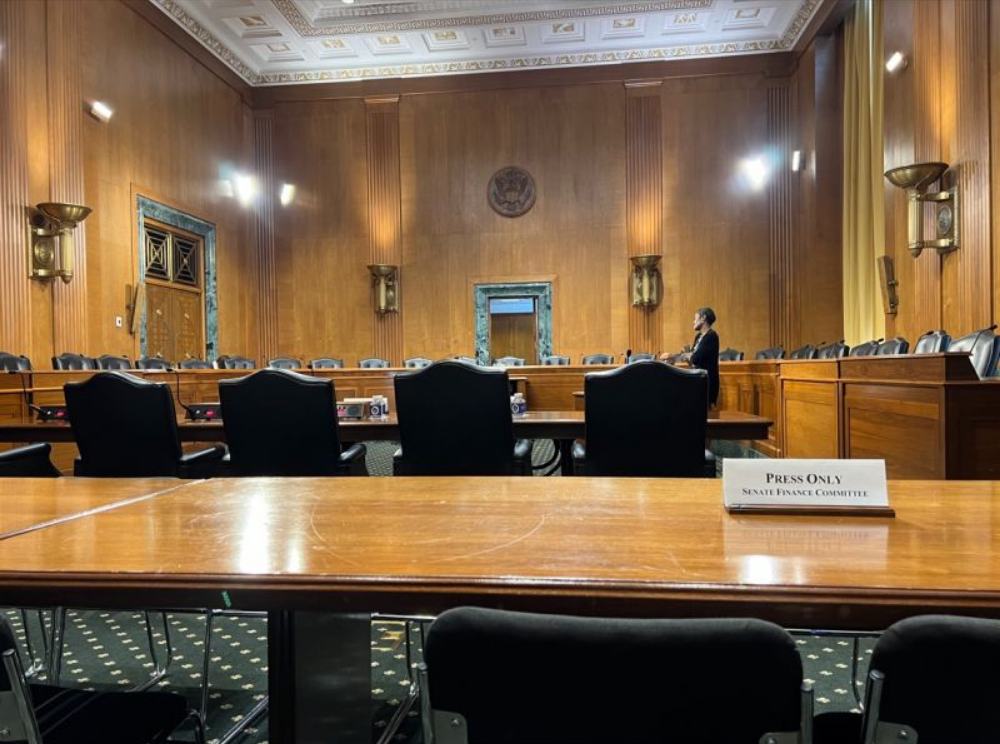
WASHINGTON — In a 10-page report released on Tuesday by staff for the Democratic majority of the U.S. Senate Finance Committee, the Republican attorneys general of Tennessee, Missouri, Indiana, and Texas are accused of using “abusive legal demands” to collect the medical records of transgender patients in furtherance of the AGs’ “ideological and political goals.”
According to the document, which is titled “How State Attorneys General Target
Transgender Youth and Adults by Weaponizing the Medicaid Program and their Health Oversight Authority,” the AGs used specious or misleading legal pretexts to justify their issuance of civil investigative demands to healthcare providers.
For example, the office of Tennessee Attorney General Jonathan Skrmetti framed the request as part of a probe into the potential misuse of Medicaid funds, while the offices of Indiana AG Todd Rokita and Missouri AG Andrew Bailey cited suspected violations of consumer protection laws. The office of Texas Attorney General Ken Paxton, which demanded records from “at least two hospitals located in Texas as well as at least two medical providers” in Washington and Georgia, did not disclose why the requests were issued.
The report found that information requested by the AGs’ offices included “invasive items such as unredacted physical and mental health records, photographs of children’s bodies, correspondence to hospitals’ general email addresses for LGBTQIA+ patients, and lists of people referred for transgender health care.”
In response, and in what the committee called “a grave violation of patient privacy and trust,” some providers turned over “near-complete, patient-identifiable” information while others used legal processes available to them such as privacy protections in the Health Insurance Portability and Accountability Act (HIPAA) to share fewer details with the AGs’ offices.
The report noted that Vanderbilt University Medical Center in Nashville had “failed to object in any material manner to the Tennessee Attorney General’s sweeping request and then caused undue terror to young patients and their families by supplying the Tennessee Attorney General with some of the records requested and then, again, by erroneously notifying some patients of medical record disclosures that had not occurred.”
News concerning Vanderbilt’s receipt of and compliance with the demands from Skrmetti’s office was made public in June, sparking widespread concern and panic among many of the center’s trans patients and their families. Some, according to the report, experienced suicidal ideation and emotional distress including depression and anxiety.
A plaintiffs’ lawsuit was filed in July over VUMC’s failure to redact personally identifying information from the medical records. The following month, the center disclosed plans to comply with an investigation by the U.S. Department of Health and Human Services Office of Civil Rights.
In a statement to NBC News, Michael Regier, the medical center’s general counsel and secretary, said the hospital disputes the findings published in the committee’s report and had submitted “a detailed letter outlining our concerns about its proposed findings before it was released.”
“We made every effort to both protect our patients and follow the law,” Regier said, adding that “At no point did we violate privacy laws, and we strongly disagree with any suggestion that we did.”
However, the committee’s report notes that by contrast, providers in other states like the Washington University School of Medicine in St. Louis refused to turn over patient records, citing privacy concerns and HIPPA regulations. And after staff for Sen. Ron Wyden (D-Ore.), the committee chair, had requested and reviewed copies of correspondence between VUMC and the Tennessee AG’s office, they concluded that the documentation “sheds light, for the first time, on the full extent of VUMC’s acute and repeated failures to protect its patients.”
For example, the report explains that after Skrmetti’s office issued the initial request to VUMC, it followed up with two additional civil investigative demands for “confidential information across 18 categories without any bounds on the number of patients or people implicated” ranging from “employment contracts for physicians to volunteer agreements for the
VUMC Trans Buddy Program to communications to and from a general email address.”
In response, the hospital shared “65,000 pages of documents, including the medical records of 82 transgender patients.” The information that was provided pursuant to receipt of Skrmetti’s office’s third civil investigative demand is unknown.
Related:
Los Angeles County
UCLA survey says quality of life in L.A. County is way down
High cost of housing is the most important factor impacting the annual Quality of Life Index, particularly among renters
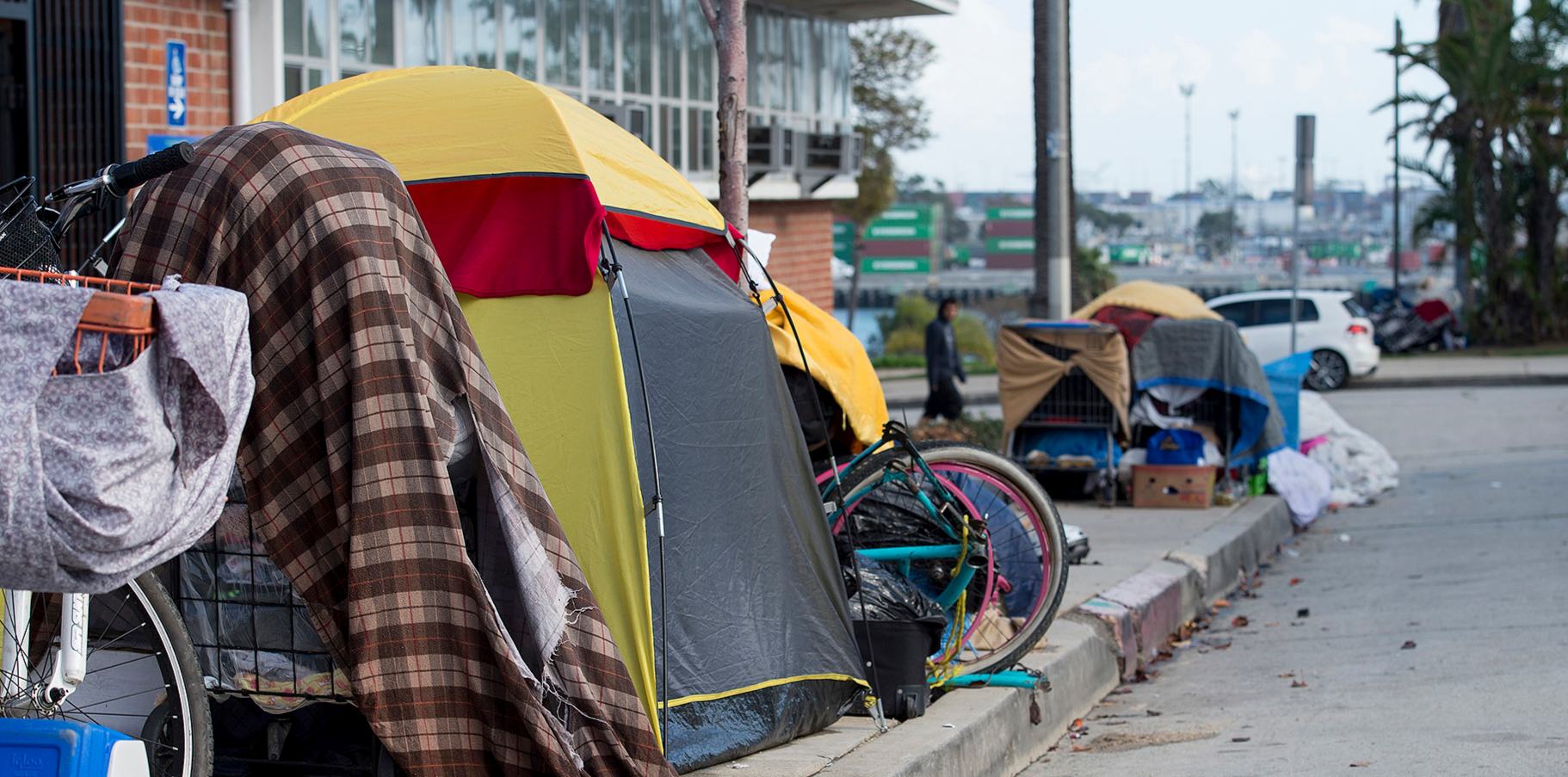
LOS ANGELES – Affordable housing, groceries and consumer goods that have all spiraled upward in cost has lowered the quality of life for Los Angeles County residents this past year according to a survey conducted by UCLA’s Luskin School of Public Affairs.
Interviews were conducted with 1,686 L.A. County residents between Feb. 22 and March 14, both in English and Spanish.
The Quality of Life Index, or QLI, is a project of the Los Angeles Initiative at the UCLA Luskin School of Public Affairs measures county residents’ satisfaction in nine categories. The overall rating fell two points from last year to 53 on a scale from 10 to 100, marking the second time in three years it came in below the survey’s 55 midpoint since the index launched in 2016. That means a majority of respondents are dissatisfied with the overall quality of their lives.
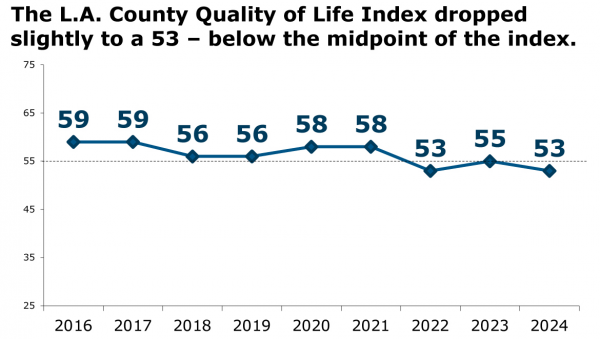
Zev Yaroslavsky, director of the study at UCLA said renters, who make up nearly half of survey respondents, are being disproportionately affected by the economic and inflationary pressures facing the region. More than half, or 59%, cited housing as the most important factor in their rating.
“Housing costs have gone up,” Yaroslavsky said. “And incomes have not gone up anywhere near commensurate with what’s happened to housing.”
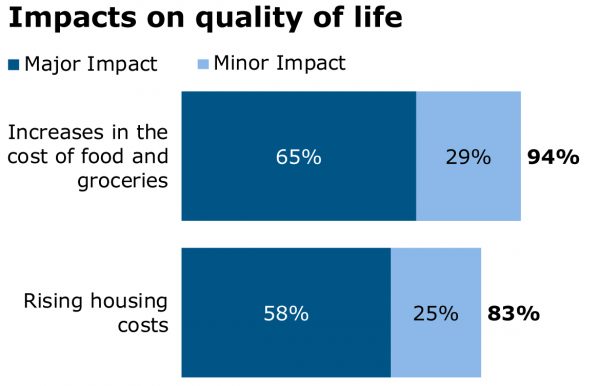
While 61% of homeowners feel optimistic about their economic future in Los Angeles County, 51% of renters report being pessimistic. Only 23% of renters think they will be able to buy a home where they would want to live at some point in the future.
KTLA reported that according to data released by the National Association of Realtors earlier this year, parts of L.A. County rank 8th highest in the nation for highest housing prices. Just 23% of the renters that responded to the survey believed that they’d be able to buy a home in an area they find desirable in the future.
Homelessness problems are worsening
This year’s survey also produced striking results on the issue of homelessness.
“We discovered very little optimism about whether the current programs and efforts to eradicate homelessness will work,” Yaroslavsky said.
More than half, or 60%, of respondents said homelessness in their area has gotten worse over the past year, with only 10% saying it has gotten better. Just 20% are more hopeful than they were last year that the homelessness situation in Los Angeles County will improve.
Respondents were also asked whether they worried about becoming homeless themselves, with the highest levels of anxiety expressed by people living in households earning less than $60,000 annually at 44%, renters 37% and African Americans 33%.
“Despite the best efforts of state and local officials, the public is more negative and less hopeful about solving homelessness,” Yaroslavsky said.
In an email to the Blade Wednesday, Chair of the Los Angeles County Board of Supervisors Lindsey Horvath said:
“Watching my neighbors struggle with affordability or be on the brink of homelessness is what calls me to be of service to our community. We need to urgently address our overlapping homelessness and affordable housing crises by expediting production of all forms of housing, expanding tenant protections, and ensuring fair wages to address rising income inequality.”
Dissatisfaction with the government
Noting the fact that this is an election year Yaroslavsky, a former member of the Los Angeles County Board of Supervisors from December 1, 1994 – December 1, 2014, said: “It feeds an overall sense that things aren’t working well.”
He framed this year’s results in the context of nearly a decade’s worth of research showing positive results for neighborhood quality and racial/ethnic relations, but low marks in categories commonly associated with decisions by public officials.
“A main theme over the last nine years is that Angelenos love the neighborhoods where they live. We appreciate diversity and get along with others better than some people think. And the quality of life for most of us is pretty good,” he said. “But at some fundamental level, people think our governmental institutions are letting them down.”
The last year has seen a modest decline in most ratings for elected officials.
- Los Angeles County Sheriff Robert Luna is viewed favorably by 34% and unfavorably by 26%. Last year was 37% favorable and 21% unfavorable.
- Los Angeles Mayor Karen Bass is viewed favorably by 42% and unfavorably by 32%, a drop from 46% favorable and 23% unfavorable in last year’s QLI.
- Respondents had a slightly favorable view of the city councils in their cities: 37% favorable and 32% unfavorable. The Los Angeles County Board of Supervisors is viewed more negatively: 27% favorable and 35% unfavorable.
The Quality of Life Index in issues regarding the environment found that 25% of respondents said climate change had a major impact on their quality of life in the last year; 38% saw a minor impact.
West Hollywood
Family demanding answers in beating of gay hair stylist in WeHo
The family questions why it taking so long for West Hollywood Sheriff’s station to retrieve video footage from local businesses

By Paulo Murillo | LOS ANGELES – Friends, family, and supporters of 54-year-old Albert Vasquez, a celebrity hairdresser found brutally beaten in West Hollywood’s Rainbow District on April 5, 2024, continue to demand answers and call for justice as they try to piece together what happened on that fateful Friday night.
Vasquez was discovered unconscious on the ground with severe head trauma, a black eye, and scrapes and scratches to his arms and legs in a parking lot behind Heart WeHo at 8911 Santa Monica Blvd, in West Hollywood’s Rainbow District.
The family questions why it taking so long for West Hollywood Sheriff’s station to retrieve video footage from local businesses. They also don’t understand why the Sheriff’s Station suggested to media outlets that Albert could have possibly fallen and gotten injured without investigating or knowing any details about his injuries.
Questions have also arisen regarding Heart WeHo, the last nightclub where Albert was allegedly seen on the night of the attack, reportedly after leaving Gym Bar according to witnesses. In efforts to solve the mystery surrounding the attack, supporters have taken to social media to demand that Heart WeHo, partly owned by celebrity entrepreneur Lance Bass of the boyband NSYNC, deliver unedited footage to detectives at the West Hollywood Sheriff’s Station.
The calls for video footage and threats to have a protest outside of Heart WeHo prompted Heart to issue a statement.
“Heart WeHo remains deeply committed to the safety and wellbeing of our community. We are aware of the incident that occurred on April 5th and have been actively collaborating with the West Hollywood Sheriff’s Department to assist in their investigation since the beginning. We have provided the authorities with unrestricted access to our security footage,” reads the statement by Heart WeHo. “We urge anyone with additional information pertaining to this incident to come forward and assist the West Hollywood Department in their efforts to ensure the safety and security of our neighborhood.”
The victim’s sister, Gloria Jimenez, tells WEHO TIMES that Heart WeHo turned over surveillance footage to the West Hollywood Sheriff’s Station on Monday, ten days after the incident occurred.
“I was hoping people would speak up or that somebody has video or something,” she said. “Everybody’s always videotaping, and we haven’t gotten anything at all. We’re really just relying on the police to expose that footage but there are all these rules and regulations where you cannot get it yourself. You have to wait for police to collect it and we were after the police to do something and they just got the footage yesterday [Monday].”
Regarding updates on Albert’s injuries, Ms. Jimenez says that doctors discovered a second skull fracture on the other side of his head. He also has bruised lungs, which went unnoticed throughout his stay at the hospital. These injuries are in addition to a black eye and scratches on his legs and arms, and it appears he was kicked in the neck.
However, despite his newly discovered injuries, Albert seems to be on the mend, she said. He was in a coma for one day when he was brought to the hospital, but is currently awake and seems to be aware of his surroundings. He starts therapy this week and is expected to be in the hospital for another week and a half. He has not spoken about what happened to him that Friday night, mainly because he’s heavily medicated and nurses feel it’s too soon to pressure him to relive the trauma.
Jimenez’s story has garnered national and global attention. His attack was published in the Daily Mail, and there is a campaign of supporters asking for justice for Albert, who is widely known in the West Hollywood community.
Ms. Jimenez alleges that they have received several tips alleging Albert was last seen at Gym Bar when he was there with friends and then he headed to Heart WeHo, which is the last time they saw him. She said in addition to the footage at Heart WeHo, she is also going to seek footage from Gym Bar to determine what time he left and in which direction he headed.
There were also some witnesses stating that he was heavily intoxicated and that he had a confrontation with one of the securities at Heart WeHo, but that has not been confirmed. The surveillance video will answer that question.
Ms. Jimenez thanks the community for their support and for being relentless in holding investigators accountable and demanding they get answers. She’s also grateful for the public’s generosity to help cover medical expenses.
Anyone with information is asked to reach out to West Hollywood Detective Franklin at (310) 855-8850.
The family’s GoFundMe campaign: (Link)
******************************************************************************************

Paulo Murillo is Editor in Chief and Publisher of WEHO TIMES. He brings over 20 years of experience as a columnist, reporter, and photo journalist.
******************************
The preceding article was previously published by WeHo Times and is republished with permission.
Los Angeles County
Eric Schockman appointed to LA County LGBTQ+ Commission
Schockman served as high-level staffer in the State Assembly & was instrumental in passing AB 1 (1st LGBTQ+ civil rights bill in California)

LOS ANGELES – Los Angeles County Assessor Jeff Prang appointed LGBTQ+ community leader and educator as well as noted author H. Eric Schockman, Ph.D., to the first-ever Los Angeles County LGBTQ+ Commission.
Schockman currently is Professor of Politics and International Relations at Woodbury University, previously serving as Associate Dean and Associate Adjunct Professor at the Sol Price School of Public Policy at the University of Southern California.
He was President and founder of the Global Hunger Foundation, dedicated to helping women in the developing world break the chains of poverty by funding projects designed to provide sustainable development and organic farming. He served as CEO and President of a prestigious international anti-hunger organization for over a decade pumping some $60 million in grants into the field.
“This was an easy choice for this ground-breaking commission,” Los Angeles County Assessor Prang said. “I’m just grateful that Eric agreed to serve on this important commission, especially in light of the serious and hateful policies against the LGBTQ+ community across the country. Eric has a long record of leadership and activism, advocating for LGBTQ+ equality and will add a strong voice of experience and accomplishment to this important commission.”
Schockman served as high-level staffer in the State Assembly and was instrumental in passing AB 1 (the first LGBTQ+ civil rights bill in California). He has also written several books and edited many articles on leadership and politics in California, the nation and international affairs, and presented on scholarly panels on these same topics.
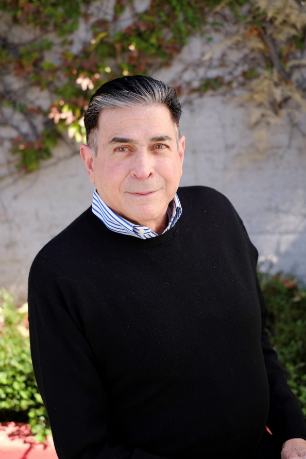
(Photo Credit: Woodbury University)
Schockman holds a Ph.D. in Political Science and International Relations from the University of California.
“I am pleased and honored to be asked to serve on this historic commission,” Schockman said. “Assessor Prang has shown his leadership in LGBTQ+ issues for years and I do not take this new assignment lightly. I am grateful to be selected.”
The Commission was created last June with a motion authored by Supervisors Hilda L. Solis and Janice Hahn. The 15-member Commission will provide recommendations on policies and budget priorities at a time when LGBTQ+ people face mounting challenges.
According to the LA County Commission on Human Relations’ 2021 Hate Crime Report, 89% of the hate crimes towards gay men were of a violent nature and 93% of anti-transgender crimes were violent – a rate of violence higher than any other marginalized group recorded by the report.
The Los Angeles County LGBTQ+ Commission will be seated and hold its first meeting in the coming months.
Arizona
Arizona Governor vetoes anti-trans, Ten Commandments bills
In a statement, the bill’s sponsor, Sen. Anthony Kern, R-Glendale, accused Hobbs of “abandoning God” with her veto

By Caitlin Sievers | PHOENIX, Ariz. – A slew of Republican bills, including those that would have allowed discrimination against transgender people and would have given public school teachers a green light to post the Ten Commandments in their classrooms, were vetoed by Gov. Katie Hobbs on Tuesday.
Hobbs, who has made it clear that she’ll use her veto power on any bills that don’t have bipartisan support — and especially ones that discriminate against the LGBTQ community — vetoed 13 bills, bringing her count for this year to 42.
Republicans responded with obvious outrage to Hobbs’ veto of their “Arizona Women’s Bill of Rights,” which would have eliminated any mention of gender in state law, replacing it with a strict and inflexible definition of biological sex. The bill would have called for the separation of sports teams, locker rooms, bathrooms and even domestic violence shelters and sexual assault crisis centers by biological sex, not gender identity, green-lighting discrimination against transgender Arizonans.
“As I have said time and again, I will not sign legislation that attacks Arizonans,” Hobbs wrote in a brief letter explaining why she vetoed Senate Bill 1628.
The Arizona Senate Republicans’ response to the veto was filled with discriminatory language about trans people and accused them of merely pretending to be a gender different than they were assigned at birth.
“With the radical Left attempting to force upon society the notion that science doesn’t matter, and biological males can be considered females if they ‘feel’ like they are, Katie Hobbs and Democrats at the Arizona State Legislature are showing their irresponsible disregard for the safety and well-being of women and girls in our state by killing the Arizona Women’s Bill of Rights,” Senate Republicans wrote in a statement.
The Senate Republicans went on to accuse the Democrats who voted against the bill of endangering women.
“Instead of helping these confused boys and men, Democrats are only fueling the dysfunction by pretending biological sex doesn’t matter,” Senate President Warren Petersen said in the statement. “Our daughters, granddaughters, nieces, and neighbors are growing up in a dangerous time where they are living with an increased risk of being victimized in public bathrooms, showers, and locker rooms because Democrats are now welcoming biological males into what used to be traditionally safe, single-sex spaces.”
But transgender advocates say, and at least one study has found, that there’s no evidence allowing transgender people to use the bathroom that aligns with their identity makes those spaces less safe for everyone else who uses them.
In the statement, the bill’s sponsor, Sen. Sine Kerr, R-Buckeye, claimed that the bill would have stopped transgender girls from competing in girls sports, something she said gives them an unfair advantage. But Republicans already passed a law to do just that in 2022, when Republican Gov. Doug Ducey was still in office, though that law is not currently being enforced amidst a court challenge filed by two transgender athletes.
Republicans also clapped back at Hobbs’ veto of Senate Bill 1151, which would have allowed teachers or administrators to teach or post the Ten Commandments in public school classrooms, a measure that some Republicans even questioned as possibly unconstitutional.
In a statement, the bill’s sponsor, Sen. Anthony Kern, R-Glendale, accused Hobbs of “abandoning God” with her veto.
“As society increasingly strays away from God and the moral principles our nation was founded upon, Katie Hobbs is contributing to the cultural degradation within Arizona by vetoing legislation today that would have allowed public schools to include the Ten Commandments in classrooms,” Kern said in the statement.
In her veto letter, Hobbs said she questioned the constitutionality of the bill, and also called it unnecessary. During discussion of the bill in March, several critics pointed out that posting the Ten Commandments in public school classrooms, tenets of Judeo-Christian religions, might make children whose families practice other religions feel uncomfortable.
“Sadly, Katie Hobbs’ veto is a prime example of Democrats’ efforts to push state-sponsored atheism while robbing Arizona’s children of the opportunity to flourish with a healthy moral compass,” Kern said.
Another Republican proposal on Hobbs’ veto list was Senate Bill 1097, which would have made school board candidates declare a party affiliation. School board races in Arizona are currently nonpartisan.
“This bill will further the politicization and polarization of Arizona’s school district governing boards whose focus should remain on making the best decisions for students,” Hobbs wrote in her veto letter. “Partisan politics do not belong in Arizona’s schools.”
******************************************************************************************

Caitlin joined the Arizona Mirror in 2022 with almost 10 years of experience as a reporter and editor, holding local government leaders accountable from newsrooms across the West and Midwest. She’s won statewide awards in Nebraska, Indiana and Wisconsin for reporting, photography and commentary.
******************************************************************************************
The preceding piece was previously published by the Arizona Mirror and is republished with permission.
Amplifying the voices of Arizonans whose stories are unheard; shining a light on the relationships between people, power and policy; and holding public officials to account.
Arizona Mirror is part of States Newsroom, the nation’s largest state-focused nonprofit news organization.
Politics
Drug policy reform pushed at National Cannabis Policy Summit
“We’ve come a long way,” Rep. Barbara Lee (D-Calif.) told the audience on Wednesday. “And now we have a long way to go”
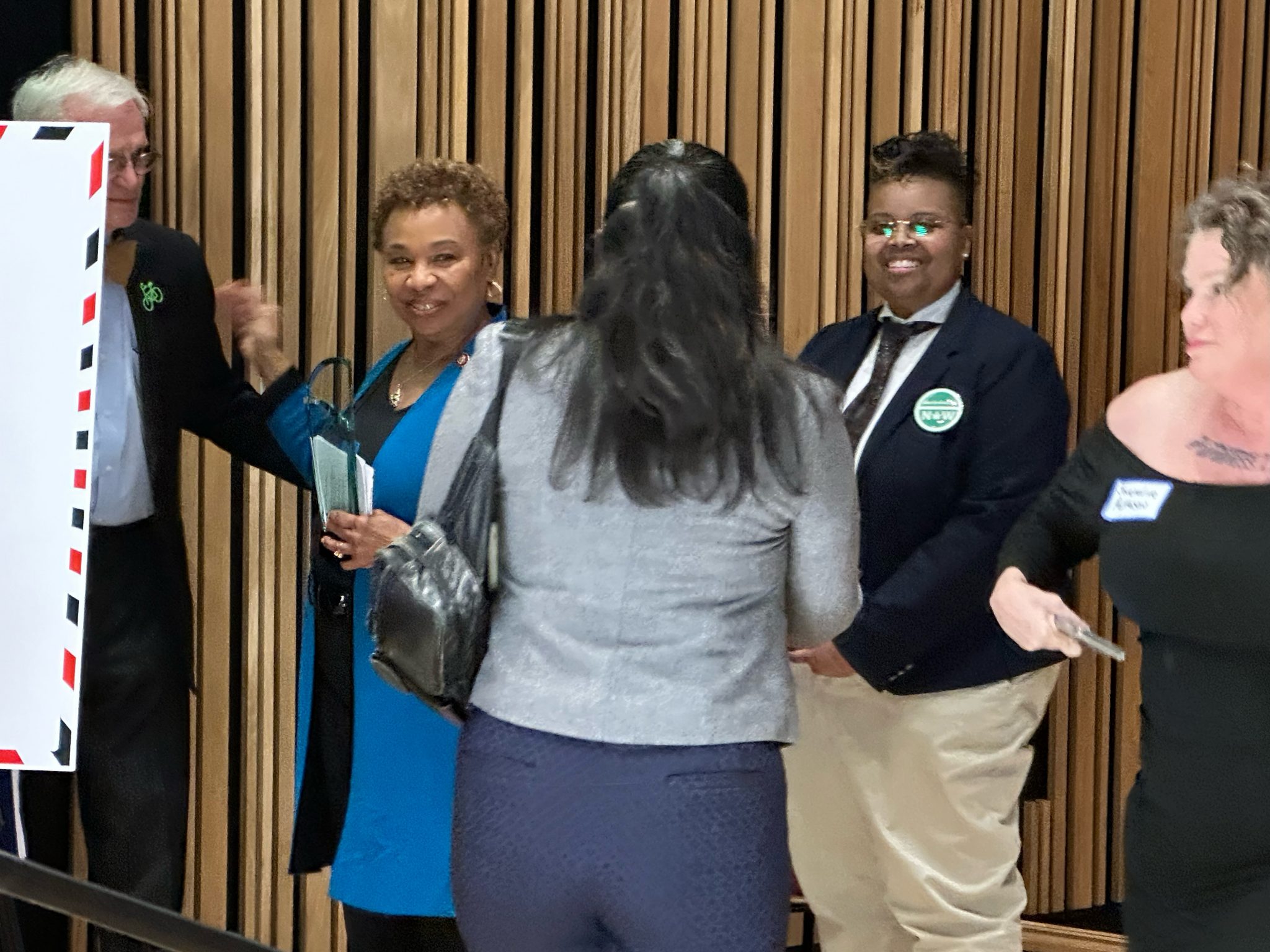
WASHINGTON – Speaking at the 2024 National Cannabis Policy Summit on Wednesday, congressional leaders pledged their support for proposals to remedy the harms of America’s War on Drugs while protecting cannabis users and cannabis businesses that are operating under a fast-evolving patchwork of local, state, and federal laws.
Overwhelmingly, the lawmakers who attended the conference at the Martin Luther King Jr. Memorial Library in D.C. or delivered their remarks virtually were optimistic about the chances of passing legislative solutions in the near-term, perhaps even in this Congress.
Participants included U.S. Sens. Raphael Warnock (D-Ga.), Jeff Merkley (D-Ore.), Elizabeth Warren (D-Mass.), and Senate Majority Leader Chuck Schumer (D-N.Y.), along with U.S. Reps. Eleanor Holmes Norton (D-D.C.), Earl Blumenauer (D-Ore.), and Barbara Lee (D-Calif.), who co-chairs the Congressional Cannabis Caucus and was honored at the event with the Supernova Women Cannabis Champion Lifetime Achievement Award.
Republicans included an aide for U.S. Rep. David Joyce (R-Ohio) who was featured in an afternoon panel discussion about the cannabis policy landscape on Capitol Hill.
Each of the members have long championed cannabis-related policy reforms, from Merkley’s SAFER Banking Act that would allow cannabis businesses to access financial services (thereby affording them the critically important protections provided by banks) to Lee’s work throughout her career to ameliorate the harms suffered by, particularly, Black and Brown communities that have been disproportionately impacted by the criminalization of marijuana and the consequences of systemic racism in law enforcement and the criminal justice system.
America is now at an inflection point
The lawmakers agreed America is now at an inflection point. Democratic and Republican leaders are coming together to support major drug policy reforms around cannabis, they said. And now that 40 states and D.C. have legalized the drug for recreational or medical use, or both, the congress members stressed that the time is now for action at the federal level.
Last summer, the U.S. Department of Health and Human Services issued a formal request to re-categorize marijuana as a Schedule III substance under the rules and regulations of the Controlled Substances Act, which kicked off an ongoing review by the Biden-Harris administration. Since the law’s enactment in 1971, cannabis has been listed as a Schedule I substance and, therefore, has been subject to the most stringent restrictions on and criminal penalties for its cultivation, possession, sale, and distribution.
Merkley acknowledged that re-scheduling would remedy the Nixon administration’s “bizarre” decision to house marijuana under the same scheduling designation as far more harmful and addictive drugs like heroin — and noted that the move would also effectively legalize biomedical research involving cannabis. However, the senator said, while re-scheduling “may be a step in the right direction, it’s not de-scheduling” and therefore would not make real inroads toward redressing the harms wrought by decades of criminalization.
Likewise, as she accepted her award, Lee specified that she and her colleagues are “working night and day on the legalization, not re-scheduling.” And her comments were echoed by Warren, who proclaimed in a prerecorded video address that “de-scheduling and legalizing cannabis is an issue of justice.”
Congressional Republicans have blocked legislation to legalize marijuana, the Massachusetts senator said, “and that is why the scheduling is so important,” as it might constitute a “tool that we can use to get this done without Republican obstruction.”

Warren, Merkley, and Schumer were among the 12 Senate Democrats who issued a letter in January to the U.S. Drug Enforcement Administration requesting transparency into its re-scheduling process while also, more importantly, demanding that the agency fully de-schedule cannabis, which would mean the drug is no longer covered by the Controlled Substances Act.
However, in a possible signal of political headwinds against these efforts, their Republican colleagues led by U.S. Sen. Mitt Romney (R-Utah) responded with a letter to DEA Administrator Anne Milgram “highlighting concerns over HHS’s recommendation to reschedule marijuana from a Schedule I to Schedule III-controlled substance.” The GOP signatories, all of whom serve on the Senate Foreign Relations Committee, also sought to “underscore the Drug Enforcement Administration’s (DEA) duty under the Controlled Substances Act (CSA) to ensure compliance with the United States’ treaty obligations under the Single Convention on Narcotic Drugs.”
As Norton noted during her prepared remarks, elected Democrats are not necessarily always on the same page with respect to expanding access to economic opportunity facilitated by cannabis. For instance, though President Joe Biden had promised, during his State of the Union address this year, to direct his “Cabinet to review the federal classification of marijuana, and [expunge] thousands of convictions for mere possession,” Norton blamed Biden along with House Republicans for provisions in the federal budget this year that prohibit D.C. from using local tax dollars to legalize cannabis sales.
A non-voting delegate who represents the city’s 690,000 residents in the House, Norton called the president’s position “deeply disappointing,” particularly considering his record of supporting “D.C. statehood, which would allow D.C. to enact its own policies without congressional interference” and grant its residents voting representation in both chambers of Congress. She added that the majority of Washingtonians are Black and Brown while all are held responsible for “the obligations of citizenship including paying federal taxes.”
Norton said the city should also have the power to grant clemency for crimes committed in the District, including cannabis-related crimes — power that, currently, can only be exercised by the president.
Efforts to reform harmful cannabis regulations
Some Republican lawmakers have been at the forefront of efforts to reform harmful cannabis regulations. For instance, a participant in a mid-afternoon panel pointed to the CURE Act, a bill introduced by U.S. Reps. Nancy Mace (R-S.C.) and Jamie Raskin (D-Md.) that would prohibit the federal government from denying security clearances based on applicants’ past or current use of cannabis.
While securing statehood for D.C. and de-scheduling cannabis via legislation or administrative action are perhaps, at least for now, a heavy lift, Merkley pointed to promising new developments concerning his SAFER Banking Act.
The Oregon senator first introduced the measure, then titled the SAFE Banking Act, in 2019, and he said the legislation’s evolution into its current iteration was difficult. “Regulators don’t want to be told what to do,” Merkley said, and negotiations with these officials involved “nitty-gritty arguments over every word.”
Pushback also came from one of Merkley’s Democratic colleagues. In September, Warnock, who is Georgia’s first Black U.S. senator, voted “no” on the 2023 version of the SAFER Banking Act, writing: “My fear is that if we pass this legislation, if we greenlight this new industry and the fees and the profits to be made off of it without helping those communities” most harmed by the War on Drugs “we will just make the comfortable more comfortable.”
Warnock’s statement followed his pointed remarks expressing concerns with the legislation during a Senate Banking Committee hearing.
“Let me be very clear,” he said, “I am not opposed to easing or undoing federal restrictions around cannabis. And I would support all of the provisions and reforms in this legislation if paired with broader cannabis reforms that substantively address the issue of restorative justice. This bill does not do that.”
At this point, however, the latest version of the SAFER Banking Act has advanced out of committee and earned the support of Senate leaders including Schumer and much of the Republican conference.
“This is the moment,” he said. “Let’s not let this year pass without getting this bill — the safer banking bill — through the House, through the Senate, and on the president’s desk.”
In her remarks, Lee also discussed the importance of business and industry-wide reforms like those in Merkley’s bill.
“We have to make sure that the cannabis industry is viewed by everyone, especially our federal government, as a legitimate business,” Lee said. “Legitimate, which deserves every single aspect of financial services that any legitimate business deserves and has access to.”
Like Warnock, the congresswoman also highlighted how these financial and business considerations intersect with “equity issues,” as “those who have been most impacted by this horrible War on Drugs” must “become first in line for the businesses and for the jobs and for the economic opportunity the cannabis industry provides.”
Marijuana Opportunity Reinvestment and Expungement Act
Reflecting on her experience introducing the Marijuana Justice Act in 2019, which was Congress’s first racial justice cannabis reform bill, Lee remembered how “everyone was like, ‘why are you doing this? It’s politically not cool.’” Her legislation sought to end the federal criminalization of marijuana, expunge the criminal records of those convicted of cannabis-related crimes, and reinvest in communities that have suffered disproportionately from the War on Drugs.
The congresswoman said she explained to colleagues how the bill addressed “many, many layers” of often-intersecting problems linked to federal cannabis policy, telling them: “This is a criminal justice issue, a racial justice issue, an issue of equity, a medical issue, a veterans’ issue, and an issue of economic security.”
Two years later, with a 220-204 vote, the House successfully passed the Marijuana Opportunity Reinvestment and Expungement Act, a comprehensive bill introduced by U.S. Rep. Jerry Nadler (D-N.Y.) and to the Senate by then-U.S. Sen. Kamala Harris (D-Calif.). The measure included Lee’s Marijuana Justice Act.
“This bill is the product of many, many years of advocacy for federal cannabis reform and equity,” she said in a statement celebrating the bill’s passage. “Make no mistake: This is a racial justice bill. It’s about the thousands of people of color who sit in jail for marijuana offenses while others profit. It’s about finally repairing the harms of the War on Drugs on communities and families across the country.”
“We’ve come a long way,” she told the audience on Wednesday. “And now we have a long way to go.”
Virginia
Norfolk, Virginia transgender resource center vandalized
“This is a place you can come to get away from that, but to see that sprayed over the window. It’s kind of like you are walking into hell”
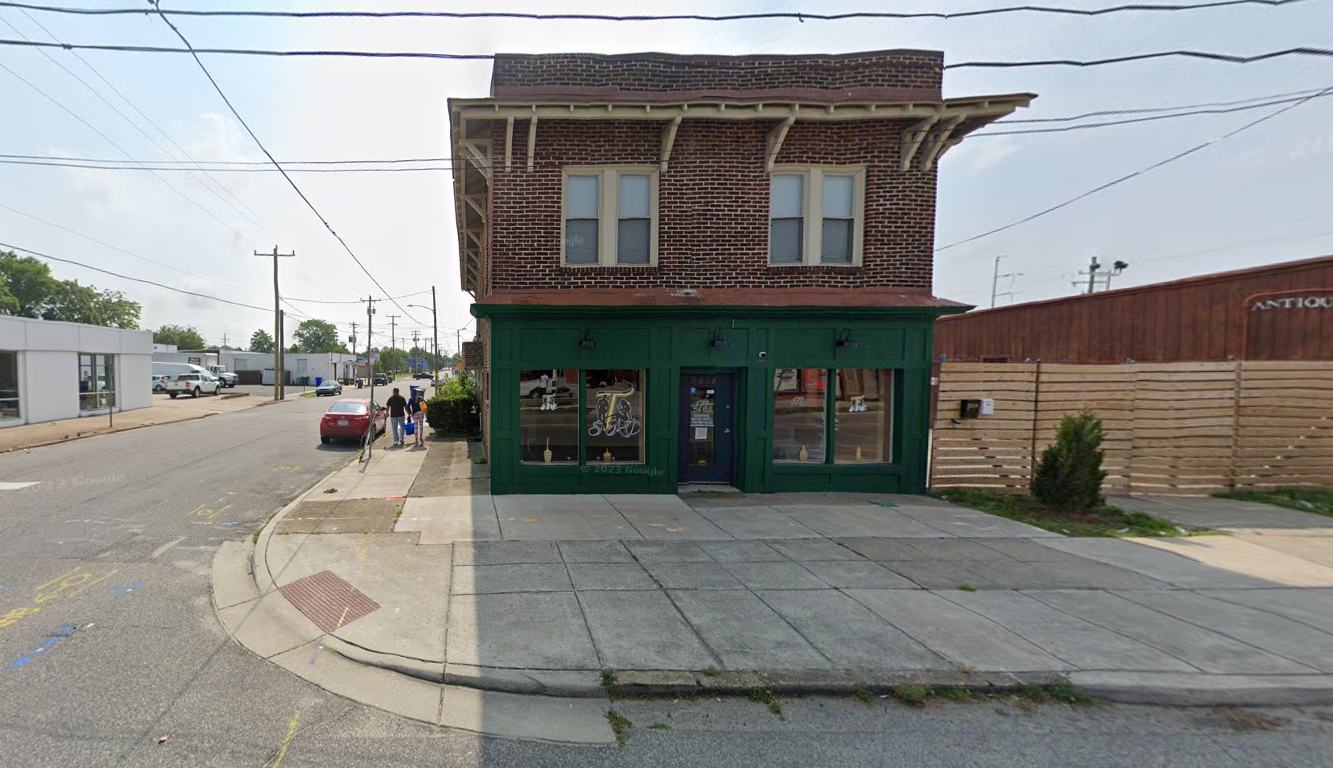
NORFOLK, Va. – The Norfolk Virginia Police Department is investigating the vandalism of a transgender resource center’s building.
Tarena Williams, founder of the Southeastern Transgender Resource Center, told WAVY that someone spraypainted anti-trans graffiti on the windows of her organization’s offices on Sunday or Monday morning. Williams told the Hampton Roads television station that seeing the messages was like “walking into hell.”
“I opened up STRC, even the Lamina House,” she told WAVY. “I opened up that to get away from those types of words. This is a place you can come to get away from that, but to see that sprayed over the window. It’s kind of like you are walking into hell. … To be honest, I was like in shock.”
Authorities are investigating the vandalism.
-

 Political commentary & analysis3 days ago
Political commentary & analysis3 days agoThe Cass Review heralds how all trans medicine will die
-

 West Hollywood4 days ago
West Hollywood4 days agoOut stylist found beaten outside Heart WeHo nightclub recovering
-

 Sports2 days ago
Sports2 days agoWNBA star Brittney Griner & wife Cherelle expecting first child
-

 Political commentary & analysis3 days ago
Political commentary & analysis3 days agoEU elections, empowering queer women & need for safe spaces
-

 North Carolina4 days ago
North Carolina4 days ago“Rainbow Story Time” gets bomb threat, closes Durham N.C. library
-

 Los Angeles3 days ago
Los Angeles3 days agoLA leaders call for unity & protection for trans community
-

 West Hollywood20 hours ago
West Hollywood20 hours agoFamily demanding answers in beating of gay hair stylist in WeHo
-

 Travel4 days ago
Travel4 days agoHot fun in the desert sun: Your Palm Springs guide
-

 Riverside County3 days ago
Riverside County3 days agoRiverside County school district kills trans outing policy
-

 West Hollywood2 days ago
West Hollywood2 days agoWeHo City Council Votes to affirm minimum wage of $19.08












